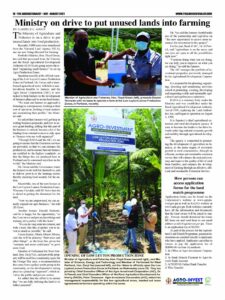Agro-Invest Corp wants more applicants for Land Owner Match Programme

A year after launching the Agricultural Land Owner Match Programme, Agro-Invest Corporation (AIC) is still hoping to attract applicants who have a minimum of 50 acres of land to let for agricultural production.
The programme, which forms part of the AIC’s mandate of facilitating agricultural investment and development, aims “to get all unused land into agricultural production”.
“We want landowners to apply, and we will do the legwork in finding a suitable investor and creating the match,” AIC explained, adding that the programme will take the hassle of letting away from landowners.
According to Alecia Brown-Forbes, manager of marketing and communications at AIC, the programme is, however, at a standstill due to a lack of enough lessors of arable land.
“The demand is greater than the supply for the simple reason that many of the people offering land do not have the title or paid-up property taxes. These are the main requirements of applying to the programme,” she told Jamaica Observer.
Since the launch of the programme on May 5, 2020, some 773 acres of land — 333 acres in Elim and 400 acres in Greenhouse — have been leased. At the beginning, the corporation used various marketing activities, such as paid radio features, newspaper ads, and social media blitz, to promote the programme. However, as it expanded the programme, it depended heavily on stakeholders as well as the media to promote it.
The Agricultural Land Owner Match Programme has two phases. Under the first phase landowners interested in in letting their land will apply to AIC, which does its due diligence checks on applicants and visits the sites to determine if the property has met the requirements for agricultural production. In the second phase, the corporation promotes available properties for lease to a suitable match.
At present, Brown-Forbes said their is a “long waiting list” of investors who would like to enter lease arrangements. In order to meet the demand of investors, AIC has adjusted its requirements to accommodate individuals who own at least 30 acres of land to apply. So far, she said, applications have come in from Westmoreland, St Ann, St Mary, and St Thomas.
“We can safely say the number of persons wanting land to lease outweighs those willing to lease land, according to the number of applications for government land we receive on a monthly basis,” she added.
Notwithstanding, Brown-Forbes is encouraging investors to continue applying, noting that AIC will provide “technical services which includes agronomy, soil type, PH levels information, [and] market linkages to exporters/manufacturers/hotels”.
Reference Link: Agro-Invest Corp wants more applicants for Land Owner Match Programme (jamaicaobserver.com)






